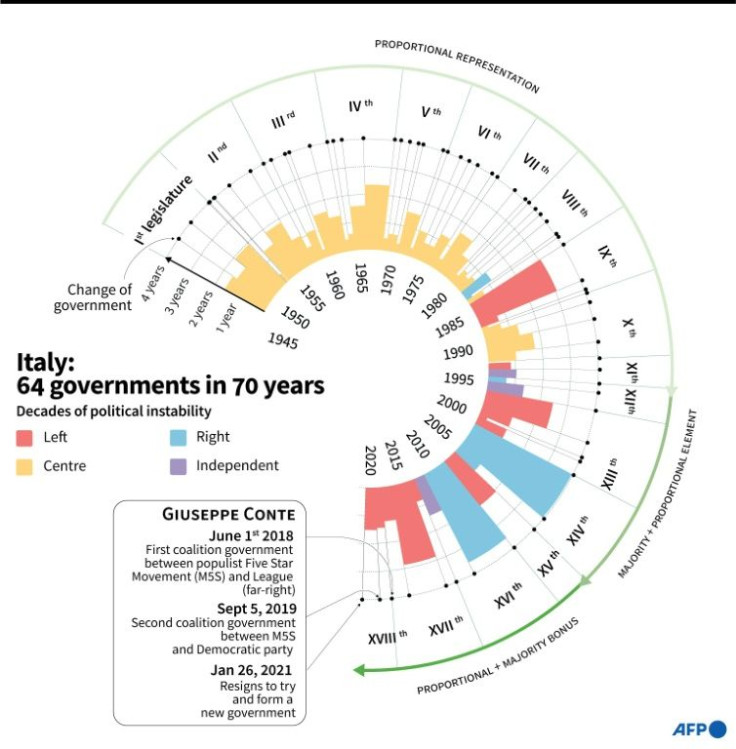Key Players Rally Behind Draghi In Italy Government Talks
Former European Central Bank chief Mario Draghi on Saturday wrapped up a first round of talks aimed at forming a new Italian government, hoping to drag the country out of its economic and Covid-19 crises.
Summoned by President Sergio Mattarella this week after prime minister Giuseppe Conte's coalition collapsed, Draghi -- dubbed "Super Mario" for extricating the eurozone from its debt crisis early last decade -- has already rallied some political players behind him.
The centre-left Democratic Party (PD) and the small Italia Viva outfit of centrist former premier Matteo Renzi -- the man behind the collapse of the last government -- had promised support, as well as Silvio Berlusconi's centre-right Forza Italia (FI).
On Saturday, the far-right League led by Matteo Salvini -- one of two heavyweight anti-establishment parties alongside the Five Star Movement (M5S) -- signalled its readiness for the economist to form Italy's 67th government since World War II.

"We stand ready. We are the biggest political force in the country, we are a force that should be in government... unlike some, we don't think we can get ahead by always saying no," Salvini said after meeting Draghi.
"I prefer to be on the inside and in control," he said.
While he did not reveal any conditions for joining a government, the former interior minister said his final decision would come after a second round of talks next week.

Time is ticking as Italy must present plans for how it will spend around 200 billion euros ($241 billion) from the EU's pandemic recovery fund -- the largest share for any single country -- by the end of April.
Draghi "already has the confidence of Europe and the markets. Soon he will receive parliament's confidence," daily Il Corriere della Sera predicted.
Wolfango Piccoli of consulting firm Teneo agreed.
"The question has somewhat shifted from 'if' Draghi could form a government to 'how' this government will be constituted, meaning which parties will be part of the coalition."

Draghi's final weekend meeting was with the anti-establishment Five Star Movement (M5S), which had backed Conte to the hilt with its roughly one-third of MPs and senators.
But saying he had always worked "for the good of the country," Conte on Thursday promised not to be an "obstacle" to Draghi and wished him "good luck!"
The League will have to overcome its reluctance to work with the PD and possible reservations about Draghi personally.
The former central banker personifies a European elite that the nationalist, anti-immigration party and its counterparts across the bloc love to hate.
After finishing his first round of talks with politicians Saturday, Draghi will meet civil society groups like unions on Monday before tackling the political parties again later next week.
While the wrangling goes on, the European Union's third-largest economy is ailing from the effects of coronavirus after shrinking 8.9 percent last year -- one of the sharpest drops in the eurozone single-currency area.
A harsh lockdown in March and April brought activity to a near-standstill after Italy became the first European nation to suffer a coronavirus wave.
So far Italy has recorded more than 90,000 Covid-19 deaths -- the second-highest toll in Europe after Britain -- and 2.6 million cases.
The more contagious British coronavirus variant has also been detected in some people testing positive.
If Draghi fails to secure a parliamentary majority or loses MPs' backing after taking office, Italy could hold early elections, probably in June.
But Mattarella, who would make such a call, said Tuesday that he wanted to avoid going to the polls while the country suffers through its health and economic shocks.
© Copyright AFP {{Year}}. All rights reserved.




















